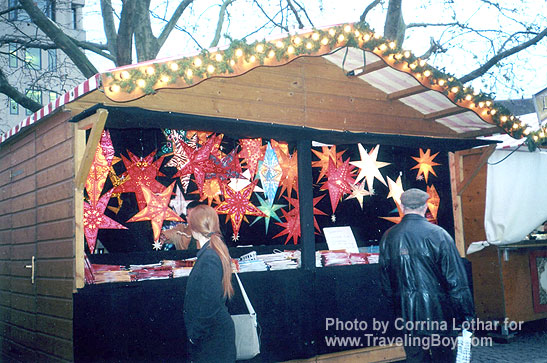 |
 |
|
 |

|
Christmas
Markets in the Alps
Story and photos by Corinna Lothar Berchtesgaden, Germany
|
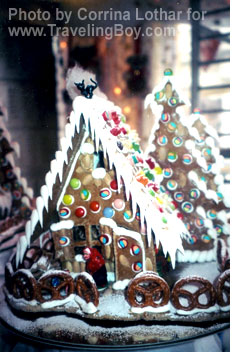 A lebkuchen (gingerbread) house for sale at a Munich market. |
Germany’s large cities, such as Dresden, Nuremberg,
Leipzig, Frankfurt and Munich all have numerous markets, large and small.
In Munich, Marienplatz, the city’s central square, is a busy warren
of stalls. Crowds of marketgoers jostle one another for a look at a
crystal ornament, a piece of jewelry, or a hot sausage to go with the
cup of gluehwein.
Nearby is the medieval market, less noisy and redolent with the
fragrance of flammbrot in the oven, a pizza like bread topped with
meats or cheeses and baked in a wood burning oven. Everything is hand-made;
shopkeepers and demonstrators dress in medieval costumes, lending
stalls a Gothic air.
A smaller market specializes in nativity figures and scenes. One of
the newer markets is located in the courtyard of the splendid Royal
Residence. The most innovative of Munich’s market is Tollwood,
on the huge field where the annual Oktoberfest in held. Tollwood was
organized in 1991 and combines traditional booths with a wealth of
international ones, some outdoors and dozens of others in tents, lighted
from outside in bright colors. Huge sculptures adorn the grounds.
Tollwood is a site for theatrical performances and in the bar-café
tent, Munich’s music scene plays along with beer and sausages.
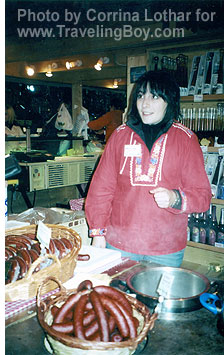 A sausage seller at the indoor market in the Zurich railroad station. |
In Zurich, Switzerland’s largest city, the chief
market is in the railroad station. An enormous fairy-tale Christmas
tree, adorned with thousands of sparkling Swarovski crystal ornaments,
presides over the market, the largest indoor market in Europe.
Truly a wonder to behold.
Smaller markets are scattered throughout the city. On one of the downtown
squares, just off Zurich’s famous Bahnhofstrasse shopping street,
a “singing Christmas tree” entertains passersby in the late
afternoon. The members of a Zurich gospel choir sing American gospel
songs, swaying to the music in tiers in front of a large tree.
In Innsbruck, Austria, the Christmas market has taken over the Old Town.
Stalls are set up beneath the vaulted stone arcades, leading to stalls
in the narrow streets and alleys. Enormous replicas of fairy-tale figures
adorn many of the second and third floors of the Old Town houses. The
children are especially delighted.
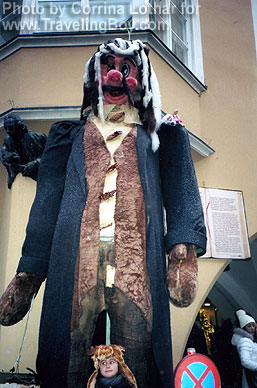 A little girl waits to be photographed with one of Innsbruck’s Giants in the Old Town, Innsbruck |
Innsbruck, the capital of the state of Tirol, was once a powerful independent
state, and in the 15th century the seat of the Holy Roman Empire. Tirol
was divided at the end of World War I when the southern part was ceded
to Italy, and on a three-day weekend Innsbruck is overrun with Italians
up to shop at the Christmas market and to enjoy the Austrian hospitality.
Tiroleans are open and friendly to visitors.
Skiers get out early on the northern and southern slopes surrounding
the city, the site of the 1964 and 1976 Winter Olympics. Snow bunnies
can ride up thousands of feet on the Hungerburg funicular and the ascent
of the cable car that would leave James Bond breathless. At the top,
there’s a splendid view of the city and a comfortable café-restaurant
from whence to watch the skiers glide down the mountainside.
Visitors don’t have to climb to the top of the mountain to visit
the spectacular Bergisel skijumping stadium on the outskirtsof the city.
Designed by Iraqi born Zaha Hadid in 2002, the ski jump is used in January
for a skiing event; in the summer, athletes train on a special
plastic covering.
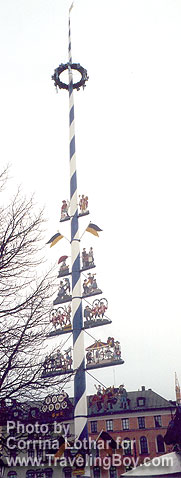 A Bavarian Christmas decoration in Munich. |
But perhaps the real charm of Christmas markets
lies in the small towns and villages of Bavaria and Tirol. In Berchtesgaden,
a historic old market town that has long been a winter and summer
resort, the past is both dead and alive. Berchtesgaden was a favorite
of Hitler’s. The houses occupied by Hitler and his Nazi henchmen
were all destroyed at the end of World War II, with the exception of
a hotel used by the Nazis. Tourists can visit Hitler’s bunkers
beneath the hotel, and nearby is a small museum reflecting Hitler’s
stay. The grim, gray Eagle’s Nest remains a curiosity, but more
for its precarious perch on the mountaintop than for its association
with the Nazis. The 20th century significance of the town is not mentioned
in brochures or by tourist organizations. The locals want this past
to stay dead.
Faulkner’s words come alive, however, in
the curious ancient Christmas tradition on the feast day of St. Nicholas.
As a rule, children leave their shoes outside their bedroom doors on
the night of December 5th in anticipation of goodies left by St. Nick.
In Berchtesgaden, however, it’s the white-bearded Bishop Nicholas
who roams through the village accompanied by a crew of fearsome buttnmandl
and krampus, the former covered from head to tow in straw, the latter
in fur with both groups wearing hideous masks with a long red tongue
that frighten more than the village children. Attached to their backs
are enormous cow bells weighing up to 45 pounds that clank in cacophony
as they run through the village streets with long switches in hand.
Anyone in the path of these young men is subject to a blow on the legs
-- not a gentle one – and having black coal smeared on his or
her face. Sometimes a girl is cornered and pushed to the ground; a child
screams under the force of a blow to his legs. This is a violent
reminder of a barbaric past, despite the concept that the original purpose
was to drive out evil spirits, so beware.
Berchtesgaden still honors the coming of the Christ
child by ringing bells and Christmas shooting, a custom dating back
to the 17th century. Guns are fired every afternoon at 3 during the
week before Christmas, to the accompaniment of church bells.
Not far from Berchtesgaden is Bad Reichenhall, a small spa town made
rich by its saline springs. In the early 20th century, King Ludwig I
of Bavaria built saltworks and a spa house in pseudo medieval style.
The special Christmas market in Bad Reichenhall, where the Reber bakery
and restaurant claim to make the original Mozartkugel (chocolate marzipan
balls) sold everywhere in Salzburg, is an indoor craft market held in
the graceful town hall in the second weekend of Advent.
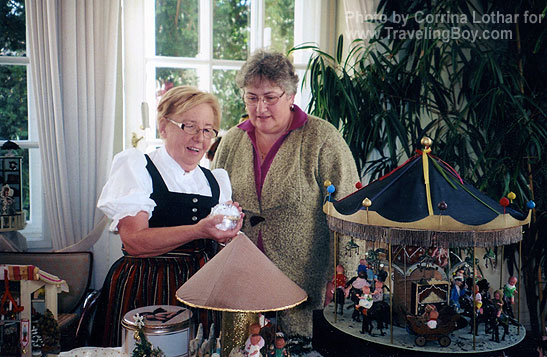
Ladies selling antique hand-made merry-go-rounds
at the Bad Reichenhall craft Christmas market.
As silent as Berchtesgarden is noisy, the lovely
Fraueninsel (Isle of Women) Christmas market entices visitors from neighboring
towns. The island on the Chiemsee is populated by a beautiful old Benedictine
convent (now used as a school), a few hotels and restaurants, a handful
of charming cottages and, at Christmas time, a Christmas market sprawling
over the entire little island. Lit by candles and torches, the market
is a magical place, especially when snow falls. In the cemetery adjacent
to the convent, candles flicker in red glass containers beside each
grave. This custom is honored as well in the Berchtesgaden cemetery.
Candles, nativity scenes, special pastries, wooden Christmas tree ornaments
and Christmas trees galore are part of the Bavarian, Tirolean and Swiss
traditions. In these regions, children are traditionally not allowed
to see their tree before sunset on Christmas Eve, but the decorations
and lights everywhere, and the festive atmosphere of the Christmas
markets create excitement and anticipation that goes well beyond anything
commercial. Christmas is still taken seriously here, and when
the bells ring out with the message of the Christ child on Christmas
Eve, everyone knows something special is about to happen.
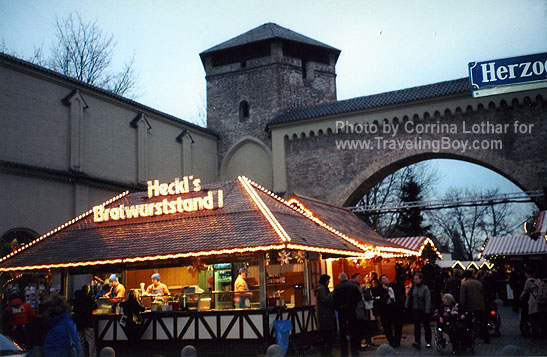
A Bavarian market stall selling Christmas
specialties. A puppet theatre for children is next door.
When You Go:
United Airlines flies nonstop from the U.S. to Munich and Zurich. Swiss
International flies from New York nonstop to Zurich. Lufthansa
flies from the U.S. to Munich.
|
I found a Mich Goss J. Grassmayr Innsbruck bell with Jesus,
a crucifix and a flower on it. Do you have any information about it you can
share with me? Many thanks. I don't have any information on that specific bell. If she wants information, "Liz" in San Bernardino should contact the factory. Here is the information: Address Grassmayr Foundry and Bell Museum, Leopoldstrasse 53, Inssbruck, A-6010 Austria. Telephone: 43 512-59416-0. Fax: 43 512-59416-22. E-mail: johannes@grassmayr.at or info@grassmayr.at. Corinna
Been there -- thought I'd done it -- you proved me wrong. Great travel coverage -- even for those who have lived there. --- Bill, Redmond, Oregon
Corinna, my dear, What a wonderful series of words you have collected together to paint a mesmerizing story about one of my favorite places. Even though I've traversed these same locales as you many times, your delightful descriptions made me want to book a flight this very second and see again some of the places that time did not allow me to linger in before. Your photos are also riveting, and I loved the pantyhose one - what a clever, sexy way to promote that article of the female form. Your colorful words make the entire region literally come alive before my eyes - a rare gift for any writer! Bravo and again Congrats on your top notch feature. Best regards. Best regards,
Hello Corinna, This is very roundabout ... I was recently teaching (Legal Reasoning) in Kabul and encountered Ann Geracimos, who said she knows you from the Times. She recently provided me with an electronic version of your 2007 piece about returning to Frankfurt (which I enjoyed very much). Jonelle and I are well (and enjoying our 3 grandchildren, who live within blocks of our house). I hope you are well. I will now look for your travel writing regularly. Best regards,
What an amazing background Ms. Lothar has! I enjoyed her article
very much. I found it to be quite intriguing, especially the interpreter school
bit.
I loved your article on Metz. I was an exchange student living there from 1981-1982 and have always felt like Lorraine was the most overlooked part of Europe. You really captured the feel of the city with your photo and articles.
|
This site is designed and maintained by WYNK Marketing. Send all technical issues to: support@wynkmarketing.com



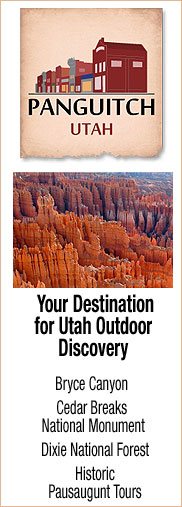








 lived in a village in the Swiss Alps for two years when I was a little
girl and I remember the delicious crunch of the new fallen snow under
my shoes on a cold, still Christmas Eve when I was allowed to attend
midnight Mass in the village church. The bells rang sharp and clear
in the frosty air, the stars twinkled in the dark sky and I knew I would
soon see my Christmas presents. All was well with my wee world.
lived in a village in the Swiss Alps for two years when I was a little
girl and I remember the delicious crunch of the new fallen snow under
my shoes on a cold, still Christmas Eve when I was allowed to attend
midnight Mass in the village church. The bells rang sharp and clear
in the frosty air, the stars twinkled in the dark sky and I knew I would
soon see my Christmas presents. All was well with my wee world. 